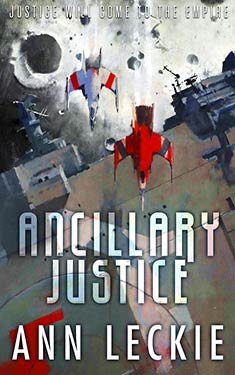Ann Leckie
Completed 3/6/2014, Reviewed 3/6/2014
2 stars
“Ancillary Justice” is a complex novel. There are a lot of good ideas and fun plots
strewn around it. There’s the twist to
the AI computer has a nervous breakdown plot, there’s the evil empire, there’s
the noir-ish assassin, there are the subjugated people assimilated into the
AI’s human network, and finally there’s the part that everyone’s already
reviewed the heck out of: the language
without gender. It has all the makings
of a terrific novel, but to me, it just fell flat.
There is so much to this novel that it’s hard to give a
synopsis. I’ve already listed most of
the plot lines, but I’ll try to wrap it together in a few sentences. Breq is an AI, inhabiting a single body. She used to be a ship with hundreds of human
bodies acting as tentacles, or ancillaries, all part of her collective (yes, a
little like the Borg from STNG). She is
on a mission to assassinate the Lord of the Radche. The Lord of the Radche has ancillaries too,
but some have been infiltrated by an alien race. On her way, she encounters and helps a former
captain who has OD’ed on a frozen planet.
Together, they try to find the LOTR (heh) and destroy her before she
destroys the empire.
The biggest problem I found with the book is that the
timelines jump all over the place. I’m
not just referring to the simple device of chapters alternating between past
and present. It’s the constant use of
backstory and exposition. It made the
reading cumbersome. There were also
numerous long expositions to trudge through.
I think the issue was really that this book is the first of an intended
trilogy. Rather than load up on moving
the plots, the author was trying to fill out her universe.
The whole gender-bending aspect of Breq’s language is
great. There is no differentiation of
gender with words, so everyone is referred to with female nouns and pronouns: she,
niece, mother, daughter, sister. At
first it’s difficult to wrap your head around.
But I eventually found it fairly easy.
I didn’t find myself struggling over my preconceptions that a crying
person is weak and is therefore female, while a brutish person is stoic and
therefore male. They all just blended
together in an amorphous androgynous mix.
Maybe I had been warmed up to the idea by reading Ursula LeGuin’s LeftHand of Darkness several times. Or
maybe I think about gender more fluidly than most, although when I did have to
picture the characters in my head as I was reading, I did picture them looking
like Zsa Zsa Gabor in “Queen of Outer Space”. (Okay, so I’m not that
well-adjusted!) But even this took a
back seat to the boredom created by the tedious storytelling.
I was confused by the whole ancillary concept. My understanding is that ancillaries are “corpse
soldiers”, humans whose personalities and memories have been effectively wiped
out and are under the control of an AI.
This technology allows the AIs to have eyes, ears, and control all over
a ship, station, or planet. The LOTR
also has ancillaries, but we find out that an alien race has infiltrated some
of the LOTR’s ancillaries. So the Lord
must keep some of her activities from herself so that the bad ancillaries don’t
know what the good ancillaries are doing.
But this invalidates the idea that the central brain has complete
control over the ancillaries and that some are thinking for themselves, which
is a contradiction. Is this a plot hole,
or intentionally designed to be revealed in a later volume? I found the lack of an answer to be
frustrating.
On a similar note, the LOTR’s name is Mianaai. I couldn’t help but wonder if this was a play
on “me and I”. Is this implying that the
Breq is the same entity as the LOTR? Is
it an allusion to the many ancillaries of the LOTR? Perhaps it is a play on “me, an AI”, implying
that the LOTR is herself an AI, rather than a human. Again, it seems to be something planted to
get to read the rest of the trilogy.
Finally, after reflecting on all the plots and devices, I
eventually found myself wondering if there was really anything new here. The main plots can easily be described as a mash
up of the Borg, HAL 9000, the Star Wars empire, and the frozen world and androgyny
of Left Hand of Darkness. Of course
there are a lot mash-ups out there. It
isn’t often that someone breaks new ground in SF/F anymore. Yet in the hands of a good writer, a trite
mash-up could be an incredibly interesting and exciting story. Instead, Leckie simply left me cold. I give this book two stars, basically, an E for
effort.

No comments:
Post a Comment